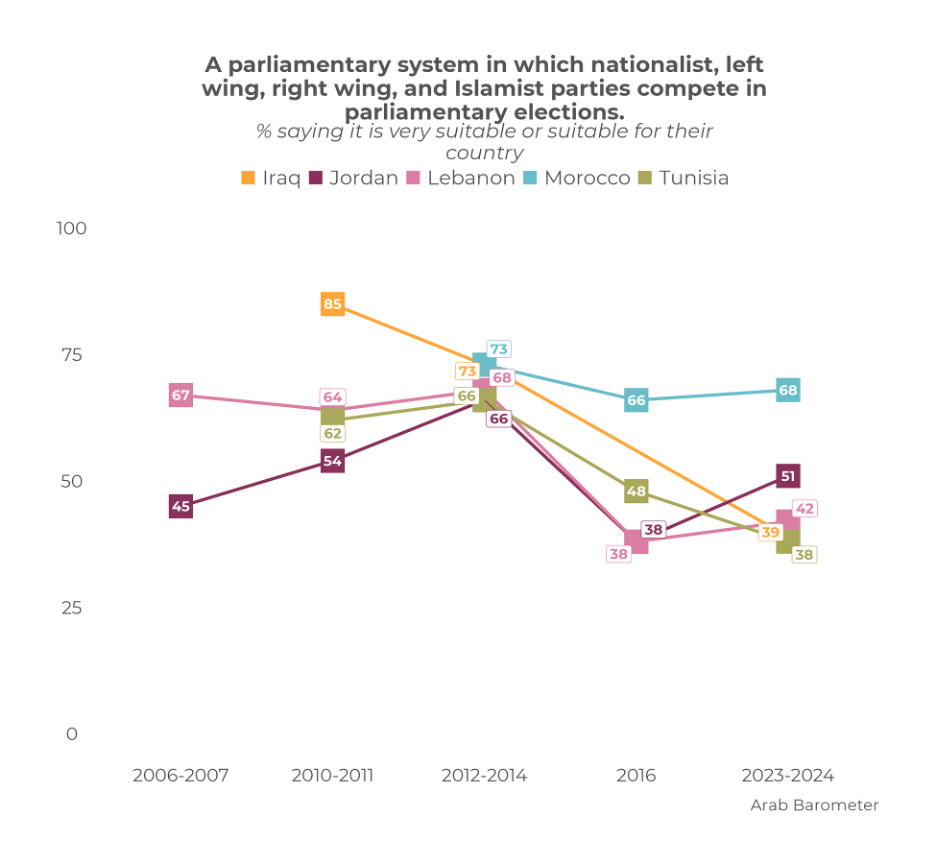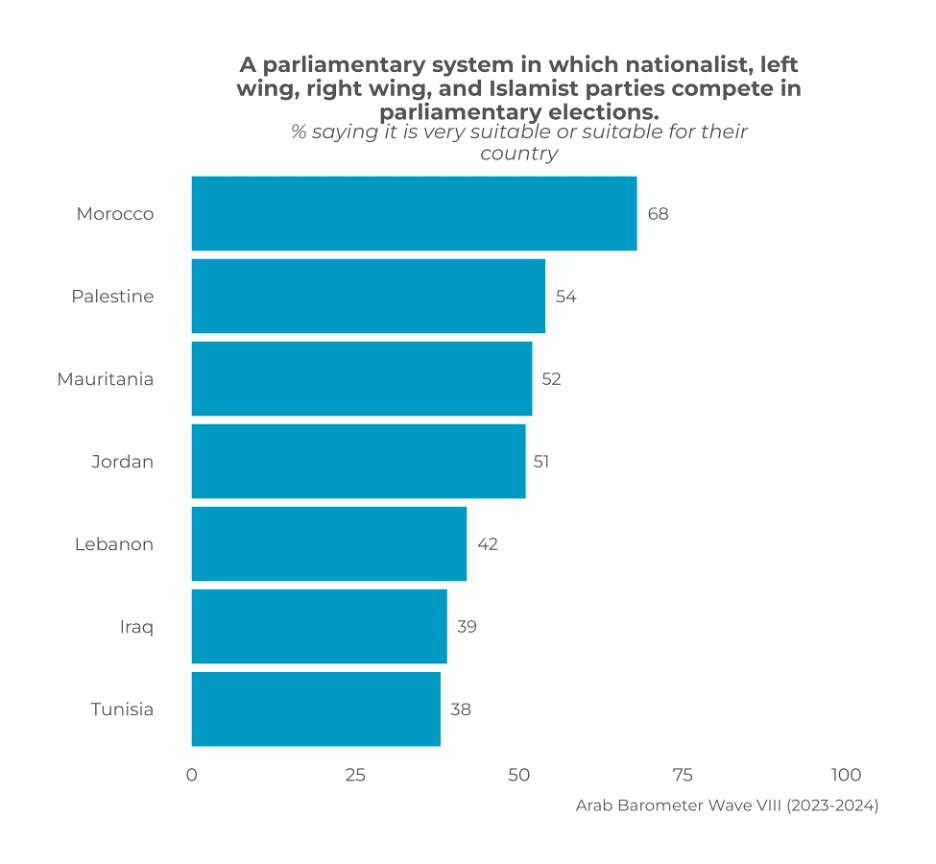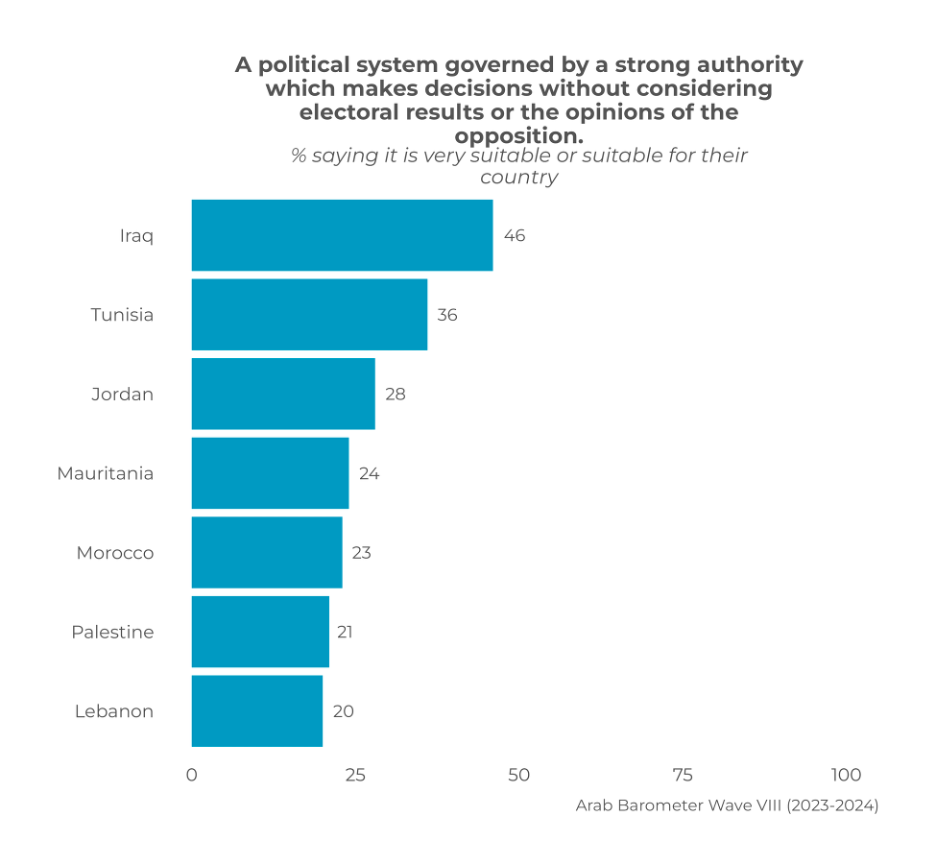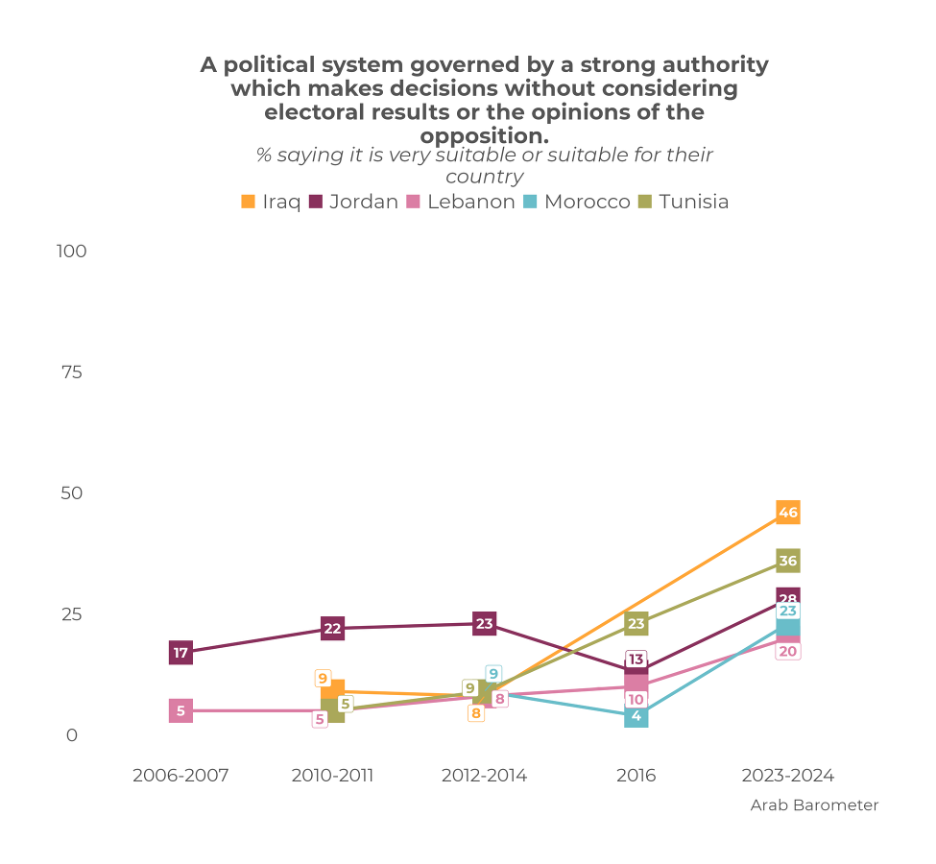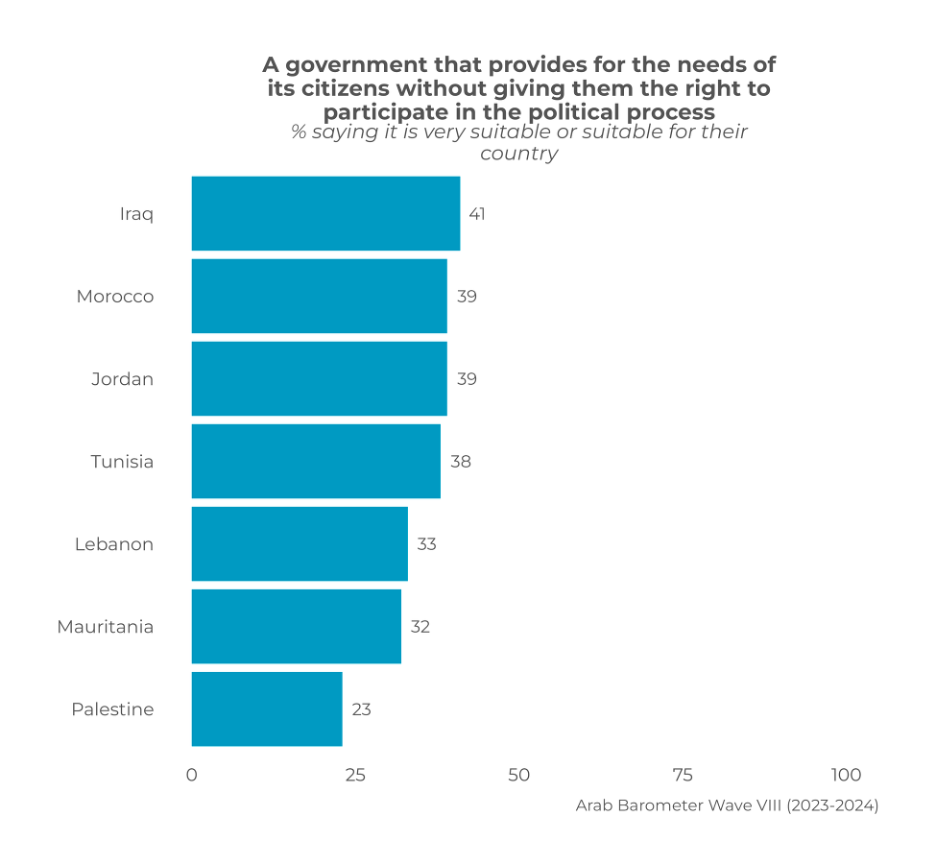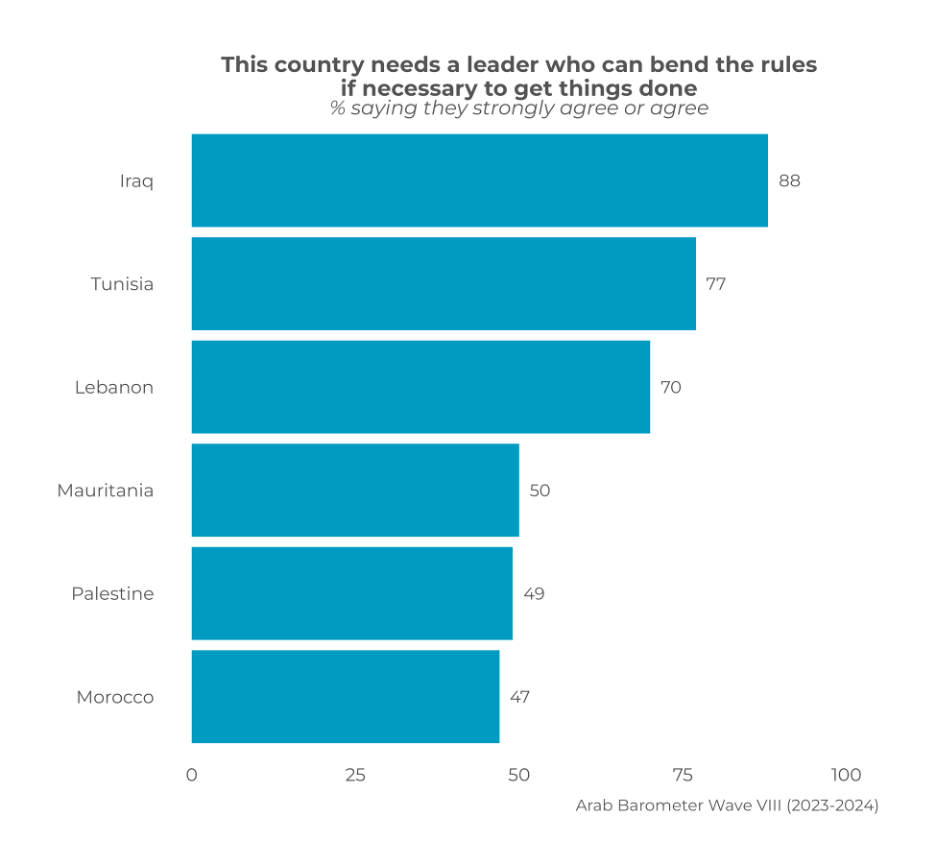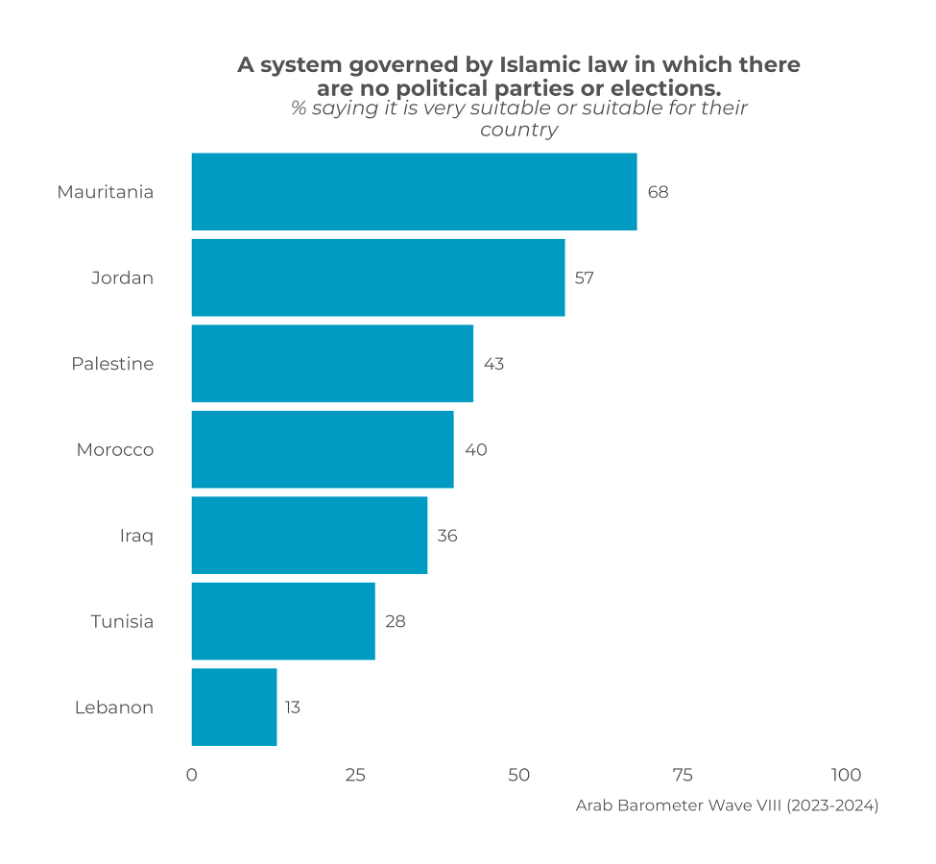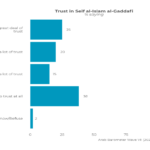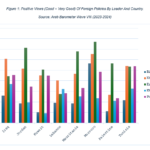For Immediate Release
**Please credit Arab Barometer**
Citizens across the Middle East and North Africa (MENA) continue to express support for democracy, but frustrations with both authoritarian rule and stalled democratic transitions are driving some toward alternative systems, according to Arab Barometer’s eighth wave of surveys.
The new report examines which forms of governance MENA publics believe can best deliver what they associate with democracy—dignity, civil rights, equality, safety, an end to corruption, and access to basic needs. Findings show that while liberal democracy remains the most supported model, backing is modest, declining, and increasingly challenged by alternatives, including strongman rule, benevolent dictatorship, and shari‘a-based governance.
These results underscore a region still searching for a system that provides not only representation but also results. Citizens continue to value democracy as an ideal—but remain divided over which political systems, if any, can meet their demands for dignity and effective governance.
About the Survey
These findings draw on seven nationally representative surveys conducted across the region as part of Arab Barometer’s Wave VIII (2023–2024), based on over 15,000 face-to-face interviews. The margin of error is ±3 points or less in each country.
Note: Fieldwork in Palestine was completed on October 6, 2023.
📊 Key Findings: Political System Preferences in MENA
Democracy: Still Preferred but Losing Ground
- Democracy remains preferred, but support is declining. Liberal democracy is still the most favored system overall, yet support is modest and falling. Backing for alternatives—strongman rule, benevolent dictatorship, and shari‘a-based governance—is rising, especially where democratic institutions are seen as ineffective.
- Tunisia is deeply split. Support for a liberal parliamentary system (38%) and an authoritarian leader (36%) are nearly equal—highlighting frustration that the 2011 Jasmine Revolution’s democratic experiment has not delivered hoped-for outcomes.
- Morocco stands apart. A clear majority supports a plural system (68%) and rejects strongman rule (23%). Morocco’s relative economic growth and improved government effectiveness may have bolstered confidence in democracy as a system.
- Shari‘a models resonate in some countries. In Jordan and Mauritania, majorities back a system based on Islamic law even without elections—though many also support liberal democracy, signaling interest in blended models.
Liberal Democracy: Modest and Uneven Support
- Liberal democracy is modestly supported and varies across MENA. Majorities in Morocco (68%), Palestine (54%), Mauritania (52%), and Jordan (51%) favor this system, while support falls below half in Lebanon (42%), Iraq (39%), and Tunisia (38%).
- Support has declined since the Arab uprisings. In 2012–14, majorities backed parliamentary democracy, but support has dropped sharply in Iraq (-34 points), Tunisia (-28 points), Lebanon (-26 points), and Jordan (-15 points) since around the time of the Arab Spring. Only Morocco shows a modest decline (-5 points).
- Citizens define democracy by outcomes, not procedures. MENA publics associate democracy more with dignity, equality, and tangible results—such as safety and economic justice—than with elections alone.
- Youth skepticism is growing. In Tunisia, only 31% of young adults support liberal democracy, 10 points lower than older generations, underscoring disillusionment among those who came of age after 2011 Jasmine Revolution.
Authoritarian Governance: Rising but Limited
- Support for authoritarian governance is rising but remains limited. No country exhibits majority support for strongman rule—a system where a single leader governs without regard for electoral outcomes or opposition. Iraq is the only nation where more citizens favor this model over liberal democracy (46% vs. 39%). Tunisia is nearly evenly split (36% vs. 38%), while support is relatively low elsewhere, ranging from 28% in Jordan to 20% in Lebanon.
- Youth are less supportive of authoritarianism. Younger citizens are consistently less likely than older adults to favor strongman rule—by 12 points in Tunisia, 8 points in Iraq, 6 points in Mauritania, and 5 points in Jordan. Lebanon is the exception, where youth are slightly more supportive than their elders (24% vs. 18%).
- Authoritarian support has grown over the past decade. In 2012–2014, support was low—just 8% in Iraq and Lebanon, 9% in Tunisia and Morocco, and 23% in Jordan. Since then, support has grown significantly in Iraq (+38 points), Tunisia (+27 points), Morocco (+14 points), and Lebanon (+12 points), with only a modest rise in Jordan (+5 points).
Benevolent Dictatorship: Rising Demand for Results
- Support for “benevolent” dictatorship remains below 50% but is rising. Roughly 30%–40% across most countries favor a model that provides for citizens without political participation, with Palestine lowest at 23%. Support has grown notably since 2016, including in Morocco (+26 points), Jordan (+24 points), Lebanon (+20 points), and Tunisia (+10 points).
- More are willing to trade rights for results. Since 2016, support for benevolent dictatorship has grown sharply—from just 13%–28% to at least one-third across countries like Morocco, Jordan, Lebanon, and Tunisia—signaling rising demand for effective governance even at the expense of being able to have political voice.
- Majorities favor leaders who are willing to bend the rules in the name of achieving results. In Iraq (88%), Tunisia (77%), and Lebanon (70%), large shares agree that leaders should bend rules if necessary to get things done. About half share this view in Mauritania (50%), Palestine (49%), and Morocco (47%), highlighting a regional demand for progress even at the expense of legal norms often linked to democracy.
Islamic Law–Based Governance: Strong in Some Countries, Limited in Others
- Support for Islamic law–based governance varies. Majorities in Mauritania (68%) and Jordan (57%) favor shari‘a-based governance even without elections, while support elsewhere is lower (about 30%–40%). Lebanon is the clear exception, with only 13% favoring such a system. In both Mauritania and Jordan, many citizens back both parliamentary democracy and shari‘a models, suggesting openness to hybrid systems.
📊 Full Analysis: Read the full report Political System Preference in the Middle East & North Africa by Michael Robbins, Director and Co-Principal Investigator at Arab Barometer.
Please credit Arab Barometer in any dissemination.
ENDS //
Arab Barometer Media Resources
For more information or to schedule an interview with Michael Robbins, please contact Aseel Alayli, Director of Brand, Marketing and Global Communications, at aalayli@princeton.edu.
• Website: www.arabbarometer.org
• Resources for Media: www.arabbarometer.org/media-news
• FAQ: www.arabbarometer.org/frequently-asked-questions
• About Arab Barometer: www.arabbarometer.org/about
• Methodology: www.arabbarometer.org/survey-data/methodology
